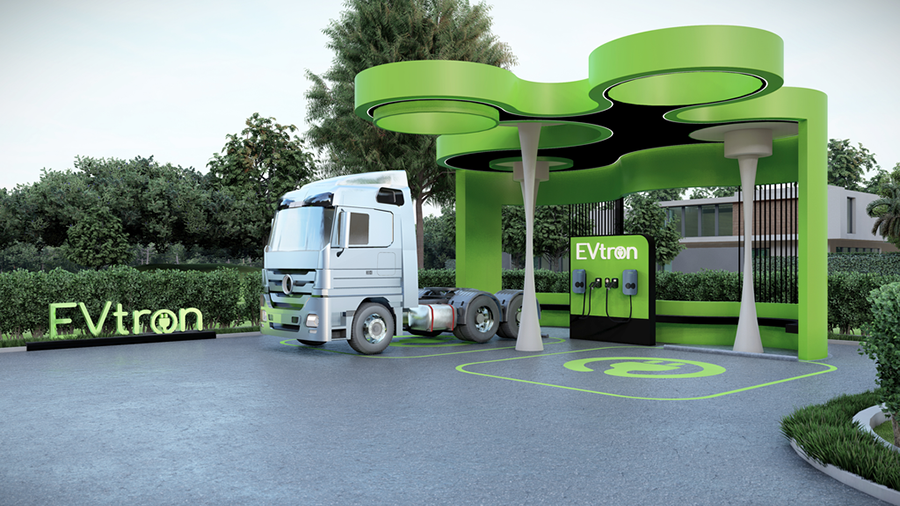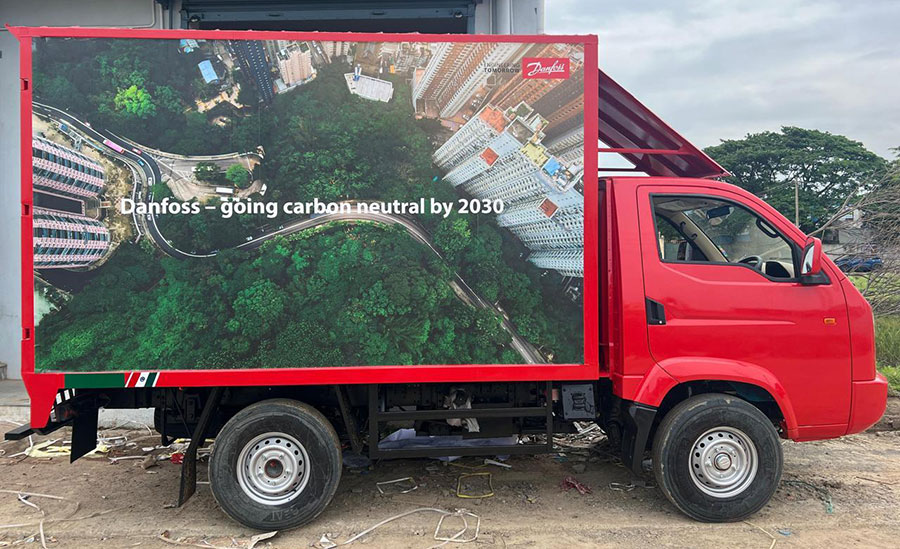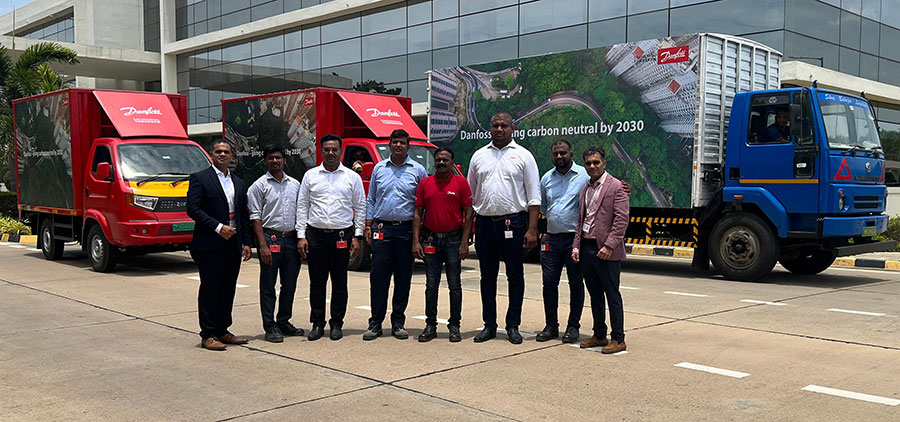

Kathiresan, co-founder of EVtron, talked to us in an insightful interview about electric vehicles, where the industry is going, and how the company strives to influence people to make the switch to EVs.
 Co founders Kathiresan, Mani, Manickam and Sabarinath
Co founders Kathiresan, Mani, Manickam and Sabarinath
The founders of EVtron started the company with a mission: to combat air pollution caused by hauling trucks. Kathiresan and Sabarinath worked together at Daimler India Commercial Vehicles in 2019. They constantly discussed how electric vehicles would shape the future, and eventually, they quit to begin their new venture along with Manickam and Mani.
Their goal was to build EV charging infrastructure, easing the inevitable shift from ICE engines to EVs. They aim to increase the number of EV charging stations to match the number of petrol and diesel stations, making it easier for people to transition to EVs. The company uses innovation to stay ahead of the game.
Establishing the company and formulating EVtron’s range of products took over a year. They had to conduct extensive market research: Was there a space for them? Would they have a customer base? Once that was affirmative, they collaborated with a UK-based company called EO, imported a few EV chargers, and deployed them along the Chennai–Bangalore highways.
Kathiresan recalls, “We were one of the earliest companies doing this, so we got decent media attention. We installed the first one in 2020, treating it as a customer discovery phase. We needed to know how many people were aware of EVs and the potential if we wanted to take this up seriously. What we realised, however, was that we needed to build the chargers ourselves. Relying on chargers from abroad was not feasible; if we needed any changes, we had to wait a considerable amount of time. We had to do it on our own for the company to prosper.”
 An EVtron charger
An EVtron charger
Kathiresan and Sabarinath were not experienced in building hardware, so they had to scour vendors in the field to build the chargers from scratch. Then came Mani and Manickam, who built the chip required to run the hardware, marking the beginning of the testing and experimentation phase.
They officially registered as a private limited company in 2024, under the name EVtron Tech Private Limited. The name, he explains, “We work with electric vehicles, which is the flow of electrons. We replaced the ‘elec’ with ‘EV’ to convey that we will play an essential role in the transition to electric vehicles.”
 Danfoss going carbon-free in the future thanks to EVtron’s installations
Danfoss going carbon-free in the future thanks to EVtron’s installations
So far, EVtron has installed 31 chargers. Working closely with logistics fleet operators, EVtron aims to reduce the amount of pollution caused by trucks. Lakhs of trucks operate yearly, and about 40–50% of those are light commercial trucks, which EVtron is working on providing solutions to. These trucks are picking up momentum and turning to electrify more vehicles.
Unorganised sectors have also begun to own small trucks, so the company caters to smaller fleets with as few as 2–5 trucks. They work in Tier-2 and Tier-3 cities as well, having installed chargers in Kumbakonam, Dindugal and Virudhunagar.
 Conceptual EVtron charging station
Conceptual EVtron charging station
The company’s proudest moment, Kathiresan says, is when they picked up their first client, Proway Logistics, and installed chargers at DHL and Danfoss. They also service clients like Flyjac, BluWheelz, and Sicgil. Another source of pride was when they were incubated by the MaDeIt Foundation at IIITDM in Kancheepuram.
“Under their mentorship and guidance, we get to constantly improve our designs and refine our business models before going to the market, paired with customer feedback. It is truly an honour,” Kathiresan smiles.
He describes the company’s business models and revenue streams as fourfold: direct sale of chargers, building charging hubs, providing software as a service, and AMC (Annual Maintenance Contract). They are currently scouting areas for destination charging in places like resorts, Airbnbs, and townships, and are identifying potential partnerships.
 The EVtron team at the Danfoss installation
The EVtron team at the Danfoss installation
EVtron was recently selected as one of the winners of Climate Pitch 2025, an initiative by Climate Collective, supported by Cummins as part of their CSR initiatives to accelerate clean-tech entrepreneurship in South Asia. Their innovative work in decarbonizing logistics through EV charging solutions stood out for its impact potential, sustainability focus, and scalability.
The Climate Pitch jury recognized EVtron’s mission-driven approach to advancing clean mobility in India and its vision to accelerate the country’s transition toward net-zero emissions. This milestone marks yet another validation of EVtron’s commitment to powering India’s sustainable transport future.
Going into details of what makes EVtron stand out from other companies in the field, Kathiresan describes, “We are a vertically integrated EV charging company, so we build both hardware and software, making us a one-stop solution for anything EV-related. In most cases, you would have to go to two different places, but with us, the integration is seamless.
We built products that are modular and scalable in architecture. If a client ever needs to upgrade their wattage to a higher capacity, we simply have to replace one part; the rest remains the same. We have a two-layer communication process involving MQTT (Message Queuing Telemetry Transport) and OCPP (Open Charge Point Protocol), which helps provide predictive reports.
We are also working on developing and patenting geo-fencing chargers, which can automatically identify the vehicle once plugged in. Lots of things are happening in the backend!”
The founders of EVtron, after thorough research, decided to go with AC charging stations instead of DC, which are the quick-charging ones on highways that they outsource. “Our AC chargers are built completely in-house and are much better to use in terms of preserving battery health and longevity. Both our home and destination chargers use AC and will fully charge a vehicle in 3–5 hours. Frequent use of DC chargers is not recommended as it tampers with battery life. Making these small changes helps improve your vehicle and the environment. That is what we hope to educate more people about.”
 EVtron team with their mentors
EVtron team with their mentors
On the topic of having a positive impact and making a difference, Kathiresan mentions two top priorities:
“We want to try and lessen the pollution emitted by logistics trucks. They only make up 3% of India’s vehicles but account for one-third of CO₂ emissions. More people making the transition from diesel/petrol to EVs would be a boon to the country, and we want to simplify it for them. 67% of logistics providers are small fleet owners, and they need someone to hold their hand and help them understand the benefits of switching to EVs, even if the upfront investment is a bit higher than usual vehicles. We want to do that for them.”
He reflects on the challenges that arise with a company like this. “Initially, we had to explain EV vehicles and charging stations. Now, there is more awareness, and people are willing to listen. The other issue is that trucks, at the moment, can comfortably travel intracity, but going intercity would mean having multiple reliable EV charging stations, which are hard to find along many routes. Grid stability is also a problem in India. Installing chargers is one thing, but having a stable power supply is hard to find with fluctuations and inconsistent voltage. We have to restructure the charger components according to location, which is a big challenge. We have to install the chargers flawlessly to ensure a hassle-free experience, and each site is different, making it an intricate process.”
Looking ahead, EVtron forecasts a boom in electric vehicles and home charging stations, cementing their position in the next 10 years. The company is trying to formulate wireless charging stations as well, which Kathiresan says might take another 5–7 years to perfect. They hope to be a global company in the future.
Kathiresan closes with, “Although our company only has eight members, we are a strong team. All of us are extremely driven individuals. Everyone has gone out of their comfort zone to get into the nitty-gritty and do whatever it takes to make this work. Everyone is propelling their efforts and hard work towards realising our vision. We, the founders, are motivated every day by our team. They believed in us and joined our company, which pushes us to do and be the best versions of ourselves.”
When this story reaches 1000 views we will cover an exclusive of this business.



